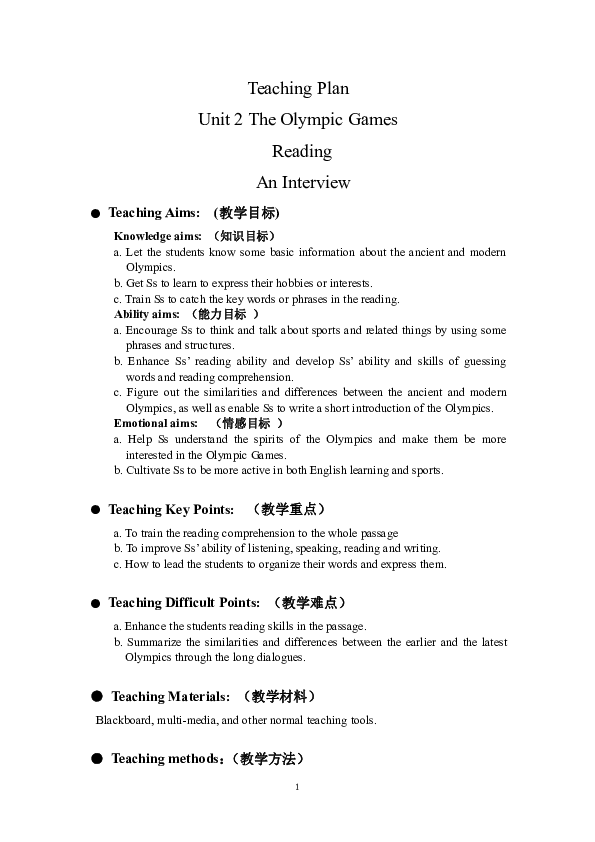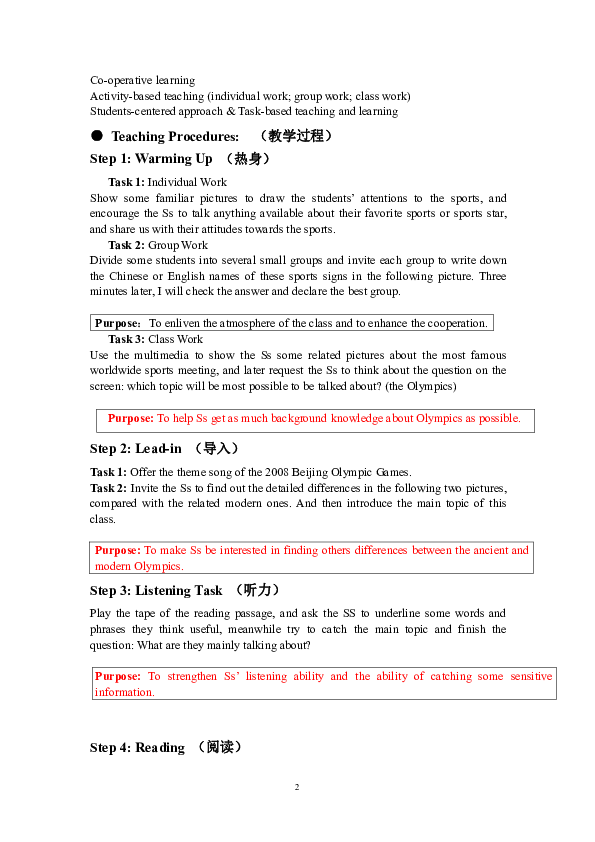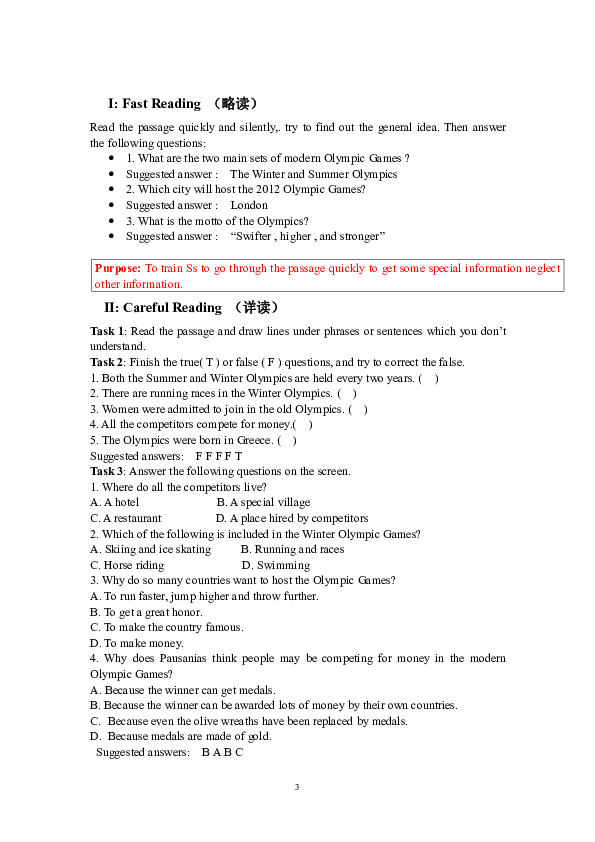Unit 2 The Olympic Games Reading 教案
文档属性
| 名称 | Unit 2 The Olympic Games Reading 教案 |  | |
| 格式 | rar | ||
| 文件大小 | 14.7KB | ||
| 资源类型 | 教案 | ||
| 版本资源 | 人教版(新课程标准) | ||
| 科目 | 英语 | ||
| 更新时间 | 2010-05-28 06:48:00 | ||
图片预览




文档简介
Teaching Plan
Unit 2 The Olympic Games
Reading
An Interview
● Teaching Aims: (教学目标)
Knowledge aims: (知识目标)
a. Let the students know some basic information about the ancient and modern Olympics.
b. Get Ss to learn to express their hobbies or interests.
c. Train Ss to catch the key words or phrases in the reading.
Ability aims: (能力目标 )
a. Encourage Ss to think and talk about sports and related things by using some phrases and structures.
b. Enhance Ss’ reading ability and develop Ss’ ability and skills of guessing words and reading comprehension.
c. Figure out the similarities and differences between the ancient and modern Olympics, as well as enable Ss to write a short introduction of the Olympics.
Emotional aims: (情感目标 )
a. Help Ss understand the spirits of the Olympics and make them be more interested in the Olympic Games.
b. Cultivate Ss to be more active in both English learning and sports.
● Teaching Key Points: (教学重点)
a. To train the reading comprehension to the whole passage
b. To improve Ss’ ability of listening, speaking, reading and writing.
c. How to lead the students to organize their words and express them.
● Teaching Difficult Points: (教学难点)
a. Enhance the students reading skills in the passage.
b. Summarize the similarities and differences between the earlier and the latest Olympics through the long dialogues.
● Teaching Materials: (教学材料)
Blackboard, multi-media, and other normal teaching tools.
● Teaching methods:(教学方法)
Co-operative learning
Activity-based teaching (individual work; group work; class work)
Students-centered approach & Task-based teaching and learning
● Teaching Procedures: (教学过程)
Step 1: Warming Up (热身)
Task 1: Individual Work
Show some familiar pictures to draw the students’ attentions to the sports, and encourage the Ss to talk anything available about their favorite sports or sports star, and share us with their attitudes towards the sports.
Task 2: Group Work
Divide some students into several small groups and invite each group to write down the Chinese or English names of these sports signs in the following picture. Three minutes later, I will check the answer and declare the best group.
Purpose:To enliven the atmosphere of the class and to enhance the cooperation.
Task 3: Class Work
Use the multimedia to show the Ss some related pictures about the most famous worldwide sports meeting, and later request the Ss to think about the question on the screen: which topic will be most possible to be talked about (the Olympics)
Purpose: To help Ss get as much background knowledge about Olympics as possible.
Step 2: Lead-in (导入)
Task 1: Offer the theme song of the 2008 Beijing Olympic Games.
Task 2: Invite the Ss to find out the detailed differences in the following two pictures, compared with the related modern ones. And then introduce the main topic of this class.
Purpose: To make Ss be interested in finding others differences between the ancient and modern Olympics.
Step 3: Listening Task (听力)
Play the tape of the reading passage, and ask the SS to underline some words and phrases they think useful, meanwhile try to catch the main topic and finish the question: What are they mainly talking about
Purpose: To strengthen Ss’ listening ability and the ability of catching some sensitive information.
Step 4: Reading (阅读)
I: Fast Reading (略读)
Read the passage quickly and silently,. try to find out the general idea. Then answer the following questions:
1. What are the two main sets of modern Olympic Games
Suggested answer : The Winter and Summer Olympics
2. Which city will host the 2012 Olympic Games
Suggested answer : London
3. What is the motto of the Olympics
Suggested answer : “Swifter , higher , and stronger”
Purpose: To train Ss to go through the passage quickly to get some special information neglect other information.
II: Careful Reading (详读)
Task 1: Read the passage and draw lines under phrases or sentences which you don’t understand.
Task 2: Finish the true( T ) or false ( F ) questions, and try to correct the false.
1. Both the Summer and Winter Olympics are held every two years. ( )
2. There are running races in the Winter Olympics. ( )
3. Women were admitted to join in the old Olympics. ( )
4. All the competitors compete for money.( )
5. The Olympics were born in Greece. ( )
Suggested answers: F F F F T
Task 3: Answer the following questions on the screen.
1. Where do all the competitors live
A. A hotel B. A special village
C. A restaurant D. A place hired by competitors
2. Which of the following is included in the Winter Olympic Games
A. Skiing and ice skating B. Running and races
C. Horse riding D. Swimming
3. Why do so many countries want to host the Olympic Games
A. To run faster, jump higher and throw further.
B. To get a great honor.
C. To make the country famous.
D. To make money.
4. Why does Pausanias think people may be competing for money in the modern Olympic Games
A. Because the winner can get medals.
B. Because the winner can be awarded lots of money by their own countries.
C. Because even the olive wreaths have been replaced by medals.
D. Because medals are made of gold.
Suggested answers: B A B C
Purpose: To train Ss the ability of combining the skimming with scanning together.
Step 5: Consolidation (巩固 )
Task 1: Try to summarize the similarities of the ancient and modern Olympics, and finish the questions.
Task 2: Use the key words to fill in the form about the main differences.
Suggested answers:
Purpose: To have a better understanding of the passage and note some useful words and phrases.
Step 6: Homework Assignment (作业)
Find more information about the Olympic Games after class, and summarize its related vocabulary. Try to write a short passage including the similarities and differences about the ancient and modern Olympics.
Preview reading: Read though the text, underline any important words or sentences, and concentrate more attention to the further understanding of the whole passage.
Purpose: To cultivate Ss to makes well preparations for the next lesson.
● Blackboard Design : (教学板书)
The Olympic Games
I like Yao because he brings many honors to our country. I practise (playing basketball) every day.(Everyday = adj)the Olympics / the Olympic Games er主动 ee 被动set: N (一)套differences: ① ② ③ Similarities:Differences:Homework assignment
Purpose: To help Ss better master these language skills or others.
● Reflection After Class: (课后反思)
●
4
Unit 2 The Olympic Games
Reading
An Interview
● Teaching Aims: (教学目标)
Knowledge aims: (知识目标)
a. Let the students know some basic information about the ancient and modern Olympics.
b. Get Ss to learn to express their hobbies or interests.
c. Train Ss to catch the key words or phrases in the reading.
Ability aims: (能力目标 )
a. Encourage Ss to think and talk about sports and related things by using some phrases and structures.
b. Enhance Ss’ reading ability and develop Ss’ ability and skills of guessing words and reading comprehension.
c. Figure out the similarities and differences between the ancient and modern Olympics, as well as enable Ss to write a short introduction of the Olympics.
Emotional aims: (情感目标 )
a. Help Ss understand the spirits of the Olympics and make them be more interested in the Olympic Games.
b. Cultivate Ss to be more active in both English learning and sports.
● Teaching Key Points: (教学重点)
a. To train the reading comprehension to the whole passage
b. To improve Ss’ ability of listening, speaking, reading and writing.
c. How to lead the students to organize their words and express them.
● Teaching Difficult Points: (教学难点)
a. Enhance the students reading skills in the passage.
b. Summarize the similarities and differences between the earlier and the latest Olympics through the long dialogues.
● Teaching Materials: (教学材料)
Blackboard, multi-media, and other normal teaching tools.
● Teaching methods:(教学方法)
Co-operative learning
Activity-based teaching (individual work; group work; class work)
Students-centered approach & Task-based teaching and learning
● Teaching Procedures: (教学过程)
Step 1: Warming Up (热身)
Task 1: Individual Work
Show some familiar pictures to draw the students’ attentions to the sports, and encourage the Ss to talk anything available about their favorite sports or sports star, and share us with their attitudes towards the sports.
Task 2: Group Work
Divide some students into several small groups and invite each group to write down the Chinese or English names of these sports signs in the following picture. Three minutes later, I will check the answer and declare the best group.
Purpose:To enliven the atmosphere of the class and to enhance the cooperation.
Task 3: Class Work
Use the multimedia to show the Ss some related pictures about the most famous worldwide sports meeting, and later request the Ss to think about the question on the screen: which topic will be most possible to be talked about (the Olympics)
Purpose: To help Ss get as much background knowledge about Olympics as possible.
Step 2: Lead-in (导入)
Task 1: Offer the theme song of the 2008 Beijing Olympic Games.
Task 2: Invite the Ss to find out the detailed differences in the following two pictures, compared with the related modern ones. And then introduce the main topic of this class.
Purpose: To make Ss be interested in finding others differences between the ancient and modern Olympics.
Step 3: Listening Task (听力)
Play the tape of the reading passage, and ask the SS to underline some words and phrases they think useful, meanwhile try to catch the main topic and finish the question: What are they mainly talking about
Purpose: To strengthen Ss’ listening ability and the ability of catching some sensitive information.
Step 4: Reading (阅读)
I: Fast Reading (略读)
Read the passage quickly and silently,. try to find out the general idea. Then answer the following questions:
1. What are the two main sets of modern Olympic Games
Suggested answer : The Winter and Summer Olympics
2. Which city will host the 2012 Olympic Games
Suggested answer : London
3. What is the motto of the Olympics
Suggested answer : “Swifter , higher , and stronger”
Purpose: To train Ss to go through the passage quickly to get some special information neglect other information.
II: Careful Reading (详读)
Task 1: Read the passage and draw lines under phrases or sentences which you don’t understand.
Task 2: Finish the true( T ) or false ( F ) questions, and try to correct the false.
1. Both the Summer and Winter Olympics are held every two years. ( )
2. There are running races in the Winter Olympics. ( )
3. Women were admitted to join in the old Olympics. ( )
4. All the competitors compete for money.( )
5. The Olympics were born in Greece. ( )
Suggested answers: F F F F T
Task 3: Answer the following questions on the screen.
1. Where do all the competitors live
A. A hotel B. A special village
C. A restaurant D. A place hired by competitors
2. Which of the following is included in the Winter Olympic Games
A. Skiing and ice skating B. Running and races
C. Horse riding D. Swimming
3. Why do so many countries want to host the Olympic Games
A. To run faster, jump higher and throw further.
B. To get a great honor.
C. To make the country famous.
D. To make money.
4. Why does Pausanias think people may be competing for money in the modern Olympic Games
A. Because the winner can get medals.
B. Because the winner can be awarded lots of money by their own countries.
C. Because even the olive wreaths have been replaced by medals.
D. Because medals are made of gold.
Suggested answers: B A B C
Purpose: To train Ss the ability of combining the skimming with scanning together.
Step 5: Consolidation (巩固 )
Task 1: Try to summarize the similarities of the ancient and modern Olympics, and finish the questions.
Task 2: Use the key words to fill in the form about the main differences.
Suggested answers:
Purpose: To have a better understanding of the passage and note some useful words and phrases.
Step 6: Homework Assignment (作业)
Find more information about the Olympic Games after class, and summarize its related vocabulary. Try to write a short passage including the similarities and differences about the ancient and modern Olympics.
Preview reading: Read though the text, underline any important words or sentences, and concentrate more attention to the further understanding of the whole passage.
Purpose: To cultivate Ss to makes well preparations for the next lesson.
● Blackboard Design : (教学板书)
The Olympic Games
I like Yao because he brings many honors to our country. I practise (playing basketball) every day.(Everyday = adj)the Olympics / the Olympic Games er主动 ee 被动set: N (一)套differences: ① ② ③ Similarities:Differences:Homework assignment
Purpose: To help Ss better master these language skills or others.
● Reflection After Class: (课后反思)
●
4
